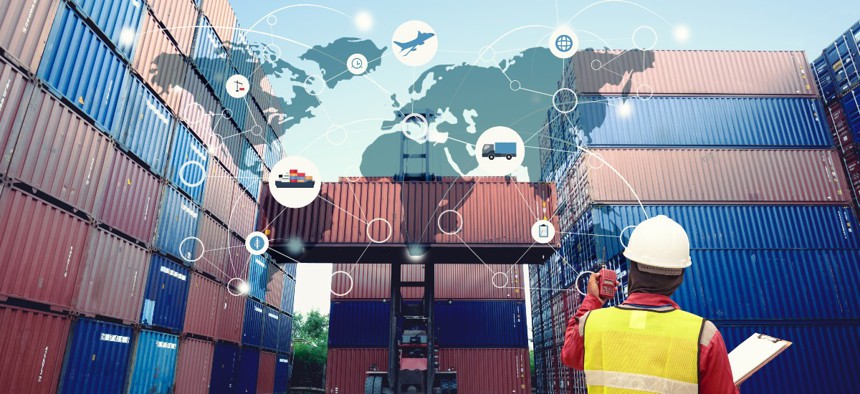US Export Controls 'in Urgent Need' of a Tech Upgrade, Experts Say

Busakorn Pongparnit/Getty Images
For the cost of “a helicopter or two,” the Commerce Department’s Bureau of Industry and Security can drastically improve the technology it uses to manage the enforcement of export controls.
The Commerce Department needs access to more advanced digital technologies to help bolster the enforcement of export controls limiting the flow of U.S.-made technologies to Russia and China, a Commerce official and other experts said during an event hosted by the Center for Strategic and International Studies think tank on Tuesday.
The discussion was held to mark the release of a new CSIS report, published on Monday, which looked at ways of ensuring the effective administration of export controls after they are applied, including through the use of artificial intelligence and new software services. While Commerce’s Bureau of Industry and Security—or BIS—oversees most export controls, the report noted that chronic underfunding has left the agency’s technology “in a dreadful state.”
“Modern, data-driven digital technologies utilizing AI and machine learning can and should play an integral role in enhancing BIS export control enforcement capabilities,” the report noted. “Relatively modest investments could lead to 5 to 10 times greater analyst productivity.”
Gregory Allen, the director of the CSIS AI Governance Project and one of the report’s co-authors, said during the event that export controls are now “relevant and critical in a way that they have not been in decades.” But he cited evidence—such as the recovery of Russian-made weapons used in Ukraine that included microelectronics manufactured by U.S. companies after additional export controls were placed on Moscow in 2014—to highlight how adversarial nations are finding ways to evade the limits.
Allen said interviews for the report with more than 50 people—including current and former BIS officials, members of the intelligence community and representatives from U.S. companies—showed a near unified consensus that “BIS is in urgent need of a technology upgrade” to enhance its oversight capabilities.
“The problem here is not that BIS is bad,” Allen said. “The problem here is that BIS’s job has gotten far, far, far harder in just the past 12 months. And in U.S. national security, we are constantly looking for where the threats are and where the opportunities are. And we ultimately conclude that the costs of these technological investments are incredibly modest.”
Allen said the report found that, for “around $45 million a year in BIS annual budgeting”—or, as he put it, “a helicopter or two in terms of budget”—the agency could procure “not only the entire technology suite they need, but also the staff increases that they need to effectively adopt these technologies.”
Allen cited some potential technological capabilities that could enhance BIS’s work, including “automatic alerting of changes that would affect the validity of a previously approved export license,” such as if a company is acquired by a Russian entity.
Alan Estevez—the undersecretary of Commerce for industry and security who leads BIS—said during the event that he “wholeheartedly concurred” with the report’s call for additional funding to enhance the agency’s oversight capabilities, adding that teaching employees to utilize some of the software and services discussed in the report would likely not be an operational challenge.
“It’s not exactly plug and play, but it’s not PhD learning curve stuff, either,” Estevez said about introducing new digital technologies across the agency. “And some of it you buy as a service. I don't need the tool itself. I need, ‘here's the report, I need you to run alerts,’ and things like that. You start up, and it just comes to you.”
Estevez added that export controls implemented on Moscow are “squeezing Russia's military reconstitution capability,” citing reports that Russia is purchasing artillery shells from North Korea to refill its own depleted munitions stockpiles. But he said that, since Russia views these restrictions as a “critical threat to their economy and to the viability of their war machine,” they are “throwing the kitchen sink at evading these export controls.”
When it comes to China, Estevez said that export controls are “a direct challenge” to Beijing’s focus on AI development and technology modernization efforts as top domestic priorities. The U.S. views Beijing’s growing tech dominance as a potential threat to national security and that of its allies, and has been working to limit China’s access to critical technologies and components.
BIS previously unveiled a series of Chinese-focused export controls on Oct. 7 to “restrict the People’s Republic of China’s ability to both purchase and manufacture certain high-end chips used in military applications and build on prior policies, company-specific actions and less public regulatory, legal and enforcement actions taken by BIS.”
Estevez said during Tuesday’s event that the U.S. is still working with international allies on a deal to limit China’s access to advanced chips and equipment, even as the U.S. is “seeing better behavior” from China when it comes to Beijing allowing U.S. officials to conduct export control checks on Chinese tech companies. But Estevez said that—like Russia—he expects Beijing to aggressively move to circumvent export controls moving forward.
“I think it's a pretty safe bet that they are also going to throw the kitchen sink,” he said.






